|
|
|
Sort Order |
|
|
|
Items / Page
|
|
|
|
|
|
|
| Srl | Item |
| 1 |
ID:
167376
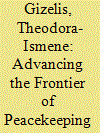

|
|
|
|
|
| Summary/Abstract |
The impact of United Nations (UN) peacekeeping on conflict has received a sustained amount of attention in the empirical literature. The advent of new data on UN peacekeeping and new temporal units of analysis have enabled researchers to expand the frontiers of peacekeeping research and undertake a more nuanced examination of peacekeeping effectiveness. In this special section, a series of articles examine how UN peacekeeping affects different types of violence within conflicts and leads to different types of peaceful outcomes. Factors such as the cultural affinity between peacekeepers and local communities, the size of peacekeeping operations and the specific composition of UN forces are shown to be important variables associated with lower levels of casualties and violence and also a higher likelihood of mediation and timely peaceful settlements in civil wars. In the aggregate, these articles suggest that robust peacekeeping is associated with better outcomes in many stages of conflict.
|
|
|
|
|
|
|
|
|
|
|
|
|
|
|
|
| 2 |
ID:
051449
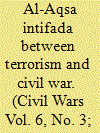

|
|
|
| 3 |
ID:
059129
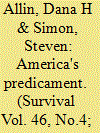

|
|
|
|
|
| Publication |
2004.
|
| Description |
p7-30
|
|
|
|
|
|
|
|
|
|
|
|
|
|
|
|
| 4 |
ID:
138420


|
|
|
|
|
| Summary/Abstract |
Although there is now a wealth of scholarship concerning the onset, duration, and termination of civil wars, there is not nearly as much empirical research by political scientists on the potential for postconflict democratization in countries that have been the site of civil wars. This relative scholarly neglect of post–civil war democratization stands in contrast to the efforts and resources that other actors—foreign ministries, international and nongovernmental organizations, and members of civil society—have invested in attempting to help construct democracy in postconflict states such as Indonesia, Liberia, and Uganda.
|
|
|
|
|
|
|
|
|
|
|
|
|
|
|
|
| 5 |
ID:
146885
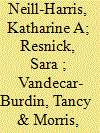

|
|
|
|
|
| Summary/Abstract |
This study examines partnerships between the military and local communities by exploring communication channels of the U.S. military and civilian agencies that provide services to transitioning military members. This article reports on a study conducted in 2013 in the Hampton Roads, Virginia area, designed to determine the degree to which the military enters into partnerships with civilian service providers. We find that navy agencies in Hampton Roads do work with community partners, but the military is more directive than one might imagine in a true partnership, leading to “uneasy” partnerships. Additionally, there are important structural and organizational barriers that prevent true partnerships from developing between navy agencies and the community providers.
|
|
|
|
|
|
|
|
|
|
|
|
|
|
|
|
| 6 |
ID:
067815
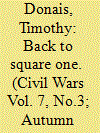

|
|
|
| 7 |
ID:
143344
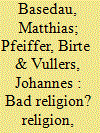

|
|
|
|
|
| Summary/Abstract |
Anecdotal evidence from many armed conflicts suggests that religion incites violence. Theoretically speaking, several facets of religion can create motives and opportunities to overcome the collective action problems associated with organized violence. However, empirical research has hitherto found no conclusive answer on the extent to which religion is connected to armed conflict onset. Contributing to the filling of this gap, we use a new database that incorporates important religious factors that previous studies left largely untested. The data set covers 130 developing countries for the period 1990 to 2010. Results from logistic regressions confirm our expectation that certain religious factors fuel armed conflict—in particular, the overlap of religious and other identities, religious groups’ grievances, and religious leaders’ calls for violence. We also find that religious determinants vary in their impact according to whether conflicts are religious or not in origin.
|
|
|
|
|
|
|
|
|
|
|
|
|
|
|
|
| 8 |
ID:
182687
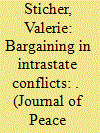

|
|
|
|
|
| Summary/Abstract |
Research shows that conflict parties engage in ceasefires in pursuit of a variety of objectives, some of which reduce while others fuel violent conflict. This article provides a framework that links these objectives to a larger process. Building on bargaining theory, three distinct bargaining contexts are specified for intrastate conflicts. In the Diminishing Opponent context, leaders believe that a military solution yields a better outcome than a political settlement. In the Forcing Concessions context, they recognize the benefit of conflict settlement, but expectations about a mutually acceptable agreement still widely diverge. In the Enabling Agreement context, expectations converge, and leaders seek to pursue settlement without incurring further costs. In line with these readings, conflict party leaders adapt their strategic goal, from seeking to set up a military advantage, to boosting their bargaining power, to increasing the chances of a negotiated settlement. They may use ceasefires in the pursuit of any of these three goals, shifting the function of a ceasefire as they gain a better understanding of bargaining dynamics. A comparison of violence and ceasefire patterns in six contemporary peace processes and a congruence test conducted on the 2012–16 peace negotiations between the Colombian government and the guerilla organization FARC offer support for the theoretical framework. The findings highlight the important, and shifting, role ceasefires play in the transition from war to negotiated peace.
|
|
|
|
|
|
|
|
|
|
|
|
|
|
|
|
| 9 |
ID:
172329


|
|
|
|
|
| Summary/Abstract |
How does diffusion of civil war battles influence conflict termination? Recent advances in civil war literature have found that battle dynamics shape conflict termination by affecting the intra-conflict bargaining between disputants. This article extends the theoretical perspective and argues that how battles diffuse matters in determining conflict termination. While battlefield dynamics should in principle reveal previously unavailable private information, the relevance of information-revealing effect depends on the diffusion patterns of battles. The persistent, and possibly battle-exacerbated, commitment problem can also alter the prospects of conflict termination. We test the argument by distinguishing two distinct diffusion patterns of battles: distant and proximate. The empirical results reveal that distant diffusion, but not proximate diffusion, of battles makes civil conflicts less likely to terminate. The analysis also demonstrates that incorporating diffusion dynamics significantly improves our ability to predict conflict termination.
|
|
|
|
|
|
|
|
|
|
|
|
|
|
|
|
| 10 |
ID:
171221
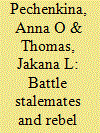

|
|
|
|
|
| Summary/Abstract |
This manuscript examines how battlefield events influence belligerents’ pursuit of negotiated settlements in civil wars. We argue that successive stalemates are most likely to precipitate rebel demands for negotiations because they offer groups both the opportunity and willingness to push for a compromise settlement. Unlike rebel losses, stalemated battles demonstrate that rebels can offer military resistance to the state. Yet, unlike rebel battle gains, draws do not raise the prospects of a rebel war victory. Using monthly data on rebel demands for negotiations and battle outcomes for 63 African dyads fighting between 1997 and 2010, we find support for this argument; more battlefield stalemates decrease the time until a proposal to negotiate by rebels. Additionally, we examine whether the same battlefield dynamics explain the onset of formal negotiations. The results reveal only a relationship between rebel battle gains and the onset of talks. The contrast in these findings suggests that rebels and governments may conceive of battlefield outcomes, especially stalemates, differently. Although rebels perceive a window of opportunity from a battlefield deadlock, governments appear to be influenced most by rebel gains.
|
|
|
|
|
|
|
|
|
|
|
|
|
|
|
|
| 11 |
ID:
159362


|
|
|
|
|
| Summary/Abstract |
After nearly four years of civil war, Libya continues to be described as an ‘ungoverned space’ where the collapse of state institutions reignited tribal, political, religious and ideological tensions. These accounts, however, obscure Libya’s complex subnational governance, and the role of non-state armed groups in shaping the emerging political orders. By contrast, we contend that distinct subnational political orders have emerged in Libya since 2014 in which actors engage in state-making practices driven by local interests. Using empirical evidence to explore the activity of non-state armed groups during the Libyan civil conflict, we highlight that the local conflict environments in eastern, western and southern Libya provide specific incentives that shape the process of armed group splintering and patterns of violence. The findings demonstrate that claims to authority and notions of statehood extend far beyond the state whereby governance relations are negotiated between state and non-state actors. Conflict patterns, (in)stability and the prevailing political order are therefore conditional on the nature of the dominant actor, their strategies and modes of violence within their areas of influence. Through this analysis, the paper provides a more granular understanding of the local political dynamics that drive violence in Libya and civil wars more generally.
|
|
|
|
|
|
|
|
|
|
|
|
|
|
|
|
| 12 |
ID:
066914
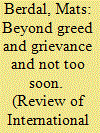

|
|
|
| 13 |
ID:
150991


|
|
|
|
|
| Summary/Abstract |
There is a tremendous amount of variation in conflict intensity both across and within civil conflicts. Some conflicts result in huge numbers of battle deaths, while others do not. Conflict intensity is also dynamic. Conflict intensity escalates, de-escalates, and persists. What explains this variation? We take one of the most prominent explanations for the onset and occurrence of civil conflict—variation in economic conditions—and apply it to the intensity and dynamics of civil conflict. Using an instrumental variables strategy and a rich set of empirical models, we find that the intensity of conflict is negatively related to per capita income. We also find that economic conditions affect conflict dynamics, as poorer countries are likely to experience longer and more intense spells of fighting after the onset of conflict.
|
|
|
|
|
|
|
|
|
|
|
|
|
|
|
|
| 14 |
ID:
121587


|
|
|
|
|
| Publication |
2012.
|
| Summary/Abstract |
The substantial literature on mass violence, from ethnic cleansing to civil wars, has paid surprisingly little attention to the largest instance of mass violence in human history: the Holocaust. When political scientists have approached the subject, the trend has been to treat the Holocaust as a single case, comparing it-sometimes controversially-with other instances of genocide such as Rwanda or Cambodia. But historically grounded work on the destruction of European Jewry can help illuminate the microfoundations of violent politics, unpack the relationship between a ubiquitous violence-inducing ideology (antisemitism) and highly variable murder, and recast old questions about the origins and evolution of the Holocaust itself. After reviewing new trends in history-writing, I highlight opportunities for social-scientifically oriented research centered on the interaction of state power, local communities, and violent mobilization in five areas: military occupation, repertoires of violence, alliance politics, genocidal policymaking, and resistance. My conclusion addresses thorny issues of comparison, morality, and memory.
|
|
|
|
|
|
|
|
|
|
|
|
|
|
|
|
| 15 |
ID:
121216
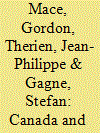

|
|
|
|
|
| Publication |
2012.
|
| Summary/Abstract |
Since 1940 the Americas have been fairly peaceful compared to other regions
of the world. Although Central America was racked by extremely violent civil
wars during the 1980s, over the past few decades the region as a whole has
not experienced many military con?icts between states. Barely a handful of
the various territorial disputes, past or present, have led to open warfare. The
last signi?cant episode, the 1995 war between Peru and Ecuador, lasted no
more than a week. Yet this relative tranquillity must not obscure the fact that
over the years, the regional security agenda has undergone major changes.
|
|
|
|
|
|
|
|
|
|
|
|
|
|
|
|
| 16 |
ID:
167381
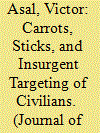

|
|
|
|
|
| Summary/Abstract |
How do conciliatory and coercive counterinsurgency tactics affect militant group violence against civilians? Scholars of civil war increasingly seek to understand intentional civilian targeting, often referred to as terrorism. Extant research emphasizes group weakness, or general state attributes such as regime type. We focus on terrorism as violent communication and as a response to government actions. State tactics toward groups, carrots and sticks, should be important for explaining insurgent terror. We test the argument using new data on terrorism by insurgent groups, with many time-varying variables, covering 1998 through 2012. Results suggest government coercion against a group is associated with subsequent terrorism by that group. However, this is only the case for larger insurgent groups, which raises questions about the notion of terrorism as a weapon of the weak. Carrots are often negatively related to group terrorism. Other factors associated with insurgent terrorism include holding territory, ethnic motivation, and social service provision.
|
|
|
|
|
|
|
|
|
|
|
|
|
|
|
|
| 17 |
ID:
163332
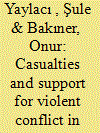

|
|
|
|
|
| Summary/Abstract |
The casualty effect is a widely studied explanation of public support for war in the context of overseas military operations, yet work on the effect of casualties on support for intrastate war is scant. This paper examines the impact of local casualties on support for using military action as a conflict resolution method for intrastate war, using data from two public opinion surveys, collected in Turkey in the absence and presence of large-scale violence, and an original dataset for the local casualties. We find that local-level casualties on average increase the support for military action in ethnic wars.
|
|
|
|
|
|
|
|
|
|
|
|
|
|
|
|
| 18 |
ID:
067814
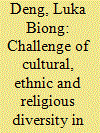

|
|
|
| 19 |
ID:
164163


|
|
|
|
|
| Summary/Abstract |
Do different types of inequality spur violence with different targets? This article explores whom violent movements choose to target when they take to arms, by comparing civil conflicts, which target the state, to communal conflicts, which target other ethnic groups. Different types of ethnic group disadvantage relate to conflict through different mechanisms. Political exclusion is expected to promote the choice to target the central government rather than other ethnic groups, while economic disadvantages should increase the risk of both civil and communal conflicts. The different expectations stem from two important differences between political and economic horizontal inequalities: only the government has the authority to change the political distribution, while there can be many avenues to economic redistribution; and blame is more straightforwardly assigned to the government for political than for economic disadvantages. Statistical analysis of 155 politically relevant ethnic groups in Africa (1991–2009) provides support for both propositions.
|
|
|
|
|
|
|
|
|
|
|
|
|
|
|
|
| 20 |
ID:
187388
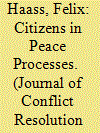

|
|
|
|
|
| Summary/Abstract |
Citizen engagement in and support for peace processes have been deemed important for sustainable peace after civil wars. Yet much of what we know about peace processes in civil wars centers on the interests of elite actors. This special feature aims to advance a research agenda focusing on citizens in peace processes to address this mismatch. In the introduction to the special feature, we first present empirical evidence situating citizens in relation to civil war peace processes. We then trace the current state of the literature on the roles of citizens in peace processes. Following that, we introduce a conceptual framework designed to improve scholarly analysis of the political behavior of citizens in peace processes. We also locate the individual contributions to the special feature within the framework in order to demonstrate its utility and as a means of helping to identify directions for future research.
|
|
|
|
|
|
|
|
|
|
|
|
|
|
|
|
|
|
|
|
|